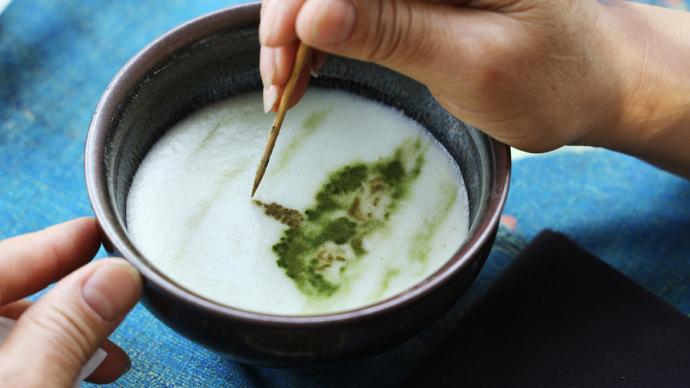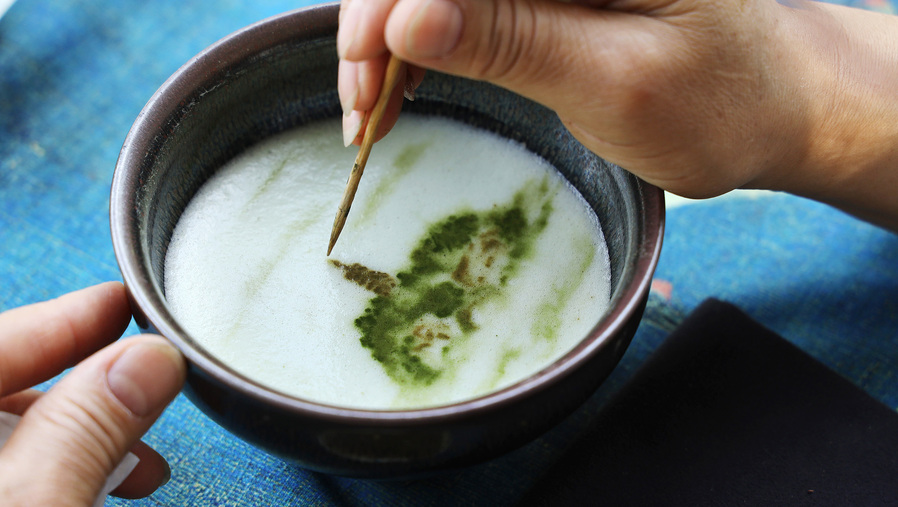
 With the popularity of the TV series "Meng Hualu", the scenes of "tea fight" and "ordering tea" depicted in the play have made many people interested in the elegant and sophisticated Song Dynasty tea affairs. Some people are amazed that the ancient Chinese people have already mastered the art of "coffee latte art". Some people are also curious, how to decide the winner or loser of the "chat fighting" with so many moves? Zhao Lin, a teacher from the Department of Cultural Relics and Museology of Fudan University, who has been engaged in the research of Chinese art history and material culture history for a long time, explained the way.
With the popularity of the TV series "Meng Hualu", the scenes of "tea fight" and "ordering tea" depicted in the play have made many people interested in the elegant and sophisticated Song Dynasty tea affairs. Some people are amazed that the ancient Chinese people have already mastered the art of "coffee latte art". Some people are also curious, how to decide the winner or loser of the "chat fighting" with so many moves? Zhao Lin, a teacher from the Department of Cultural Relics and Museology of Fudan University, who has been engaged in the research of Chinese art history and material culture history for a long time, explained the way.Japanese tea ceremony is the "student" who ordered tea in Song Dynasty
Tea flourished in the Tang Dynasty and flourished in the Song Dynasty. The tea process in the Song Dynasty includes the steps of breaking tea, rolling tea, Luo tea, placing the tea in a box, putting the powder in the cup, ordering the tea, stirring the tea, and setting the saucer. Su Shi, who had been fond of tea all his life, vividly described this process in his ci poems: he took the branches and smashed them with dew and smoke. The result is a pile of purple clouds, lightly moving the golden mill, and flying green dust. The old dragon group, the true phoenix marrow, point to the future. Talking about the taste of tea, he even sighed: in the rabbit's hair, the taste of the tongue will return in an instant. Wake up Qingzhou to engage in, fight against the sleeping devil millions, and never dream of a balcony. The wind is blowing from my armpits, I want to go to Penglai!
Unlike today's tea, the tea of the Song Dynasty was in the form of round cakes. Zhao Lin said that before ordering tea, tea cakes must be prepared. " One is to roast the tea cake , using a pincer -shaped tool made of gold or iron after bending, clamp the tea cake and bake it on the fire. Use gold or iron 'vertebra' to beat the round tea cake into pieces, and then use silver or iron tea mill to grind the beaten tea cake pieces into powder. Tea' , the tea powder is further sieved finely, and the Song people have the ultimate pursuit of ultra-fine tea powder."
After everything is ready, we will enter the most important step in the Song Dynasty tea business - ordering tea.
Cai Xiang of Song Dynasty recorded in "Tea Records", "Baicha is a money dagger, first pour the soup into the soup to make it very even, and then add more injections, and then blow back and forth." "The teaspoon should be heavy, and the blow should be strong. , iron. Bamboo is light, and tea is not taken." That is to say, use a "dagger" to scoop a certain amount of tea powder into a tea cup, then pour a little boiling water, mix it evenly with a teaspoon, and then continue to pour boiling water, Stir around with a teaspoon as you add the water. Stir the tea soup vigorously, thus requiring a heavier metal teaspoon.
While the way of ordering tea is important, the utensils must also be appropriate. Zhao Lin pointed out that tea spoons were used to stir the tea soup, and the surface of the spoon was often hollowed out to form flower patterns; in the late Northern Song Dynasty, tea bamboo became popular as a tool for mixing and stirring the tea soup, and was especially sought after by the ruler Song Huizong. However, the tea spoon did not completely replace the teaspoon, and the two were used together for a long time. As for tea cups, the Song people believed that "the color of tea is expensive and white", and it is best to use black to set off the white tea soup, so black cups were popular in the Song Dynasty.
It is worth mentioning that the ancients were very particular about the water temperature of tea, and the boiling water should not be too hot or too hot. Zhao Lin said that in ancient times, different tea drinkers had individual differences in their preferences for the boiling time of water. In the Tang Dynasty, Lu Yu made a careful observation of the boiling state of water, and distinguished three boiling states of "fish eyes", "yongquanlianzhu" and "tengbogulang". Song Huizong said in "Daguan Tea Theory": "When using soup, fish eyes and crab eyes are bound to burst forth." That is, when the water just boils, small blisters like crab eyes appear on the surface, and the heat is just right.
"The Japanese tea ceremony we know today is actually the 'students' who ordered tea in the Song Dynasty, and at the same time incorporated their own creations." Zhao Lin said.
The style of "tea fighting" flourished at all levels in the Song Dynasty
In the play "Menghualu", the heroine Zhao Paner's "half-covered face" tea house is booming, which has attracted the dissatisfaction of many old tea houses in Chatang Lane. In order to force the "half-covered" door to close, the shopkeeper Hu of "Qing Mingfang" and Zhao Paner started a tea-fighting game and invited literati and elegant scholars to comment.
Zhao Lin told reporters that in the Song Dynasty in history, the style of "chasing tea" really prevailed. "From emperors to literati, from Zen monks to folk, it flourished at all levels of society." In the Song Dynasty, in the Song Dynasty, in the battle of tea, in addition to using the sense of smell and taste, to evaluate the color and aroma of tea, vision is an indispensable guide. Sexual factors, you must "see" before "product".
"Looking at the color and shape, the tea soup should look bright and white, and the size of the tea flowers should be evenly distributed." Song Huizong had a wonderful description of the changes in the tea flowers in the process of stirring the tea soup in his "Daguan Tea Theory". From the initial "Shu Xing Jiao Yue" to "Pearl Ji Liao Luo", then to "Suwen Crab Eyes", and finally "condensing the mist and condensing the snow". In the beginning, the foam of the soup flower was uneven in size. Under the "spinning of the fingers around the wrist", it became more and more uniform and dense, and gradually became white and dense like frost and snow, reaching a state of thoroughness and integration of water and milk. The tea is done.
In addition, the duration of the soup is also a big criterion. "Fresh white, fine and dense tanghua should be close to the wall of the cup without any water marks. If the tanghua maintains this state and persists for a long time, it is the winner. If the tea is not ordered well, the tanghua will be very weak. Quickly disintegrate, water marks will appear on the wall as soon as it slackens, and the one who exposes the water marks early is the loser.”
Zhao Lin introduced that the ultimate pursuit of refinement and artistry led to the emergence of a more difficult "tea hundred opera" in the Song Dynasty. In the play, the heroine Zhao Paner relied on this superb skill to win the battle. The victory of tea. In the early Song Dynasty, Tao Gu recorded in the "Qing Yilu": In recent times, there are people who use soup to transport daggers, and do not use subtle tricks to make the water veins of soup patterns become objects, such as animals, insects, fish, flowers and plants. They are delicate and picturesque, but they disappear in a moment. The change of tea. People call it "tea hundred dramas". ……Those who drank tea and hallucinated objects in the noodle soup are also the art of the tea craftsman.
The so-called "pulling flowers" in the play has been talked about by netizens. Recently, the entry "pulling flowers on tea in ancient my country" has been trending on Weibo. In fact, if you look carefully, there is still a difference between "tea hundred opera" and "coffee lahua". my country's traditional "Tea Baixi" only uses water to pour the soup and stir to make the tea soup change its pattern, while "Coffee Lahua" is to add milk to the coffee and superimpose it into different colors. In terms of content, the "Hundred Operas of Tea" includes poems about animals, insects, fish, flowers and plants, all-encompassing. "This is a further artistic upgrade of the tea-fighting drama." Zhao Lin said.
Related Posts